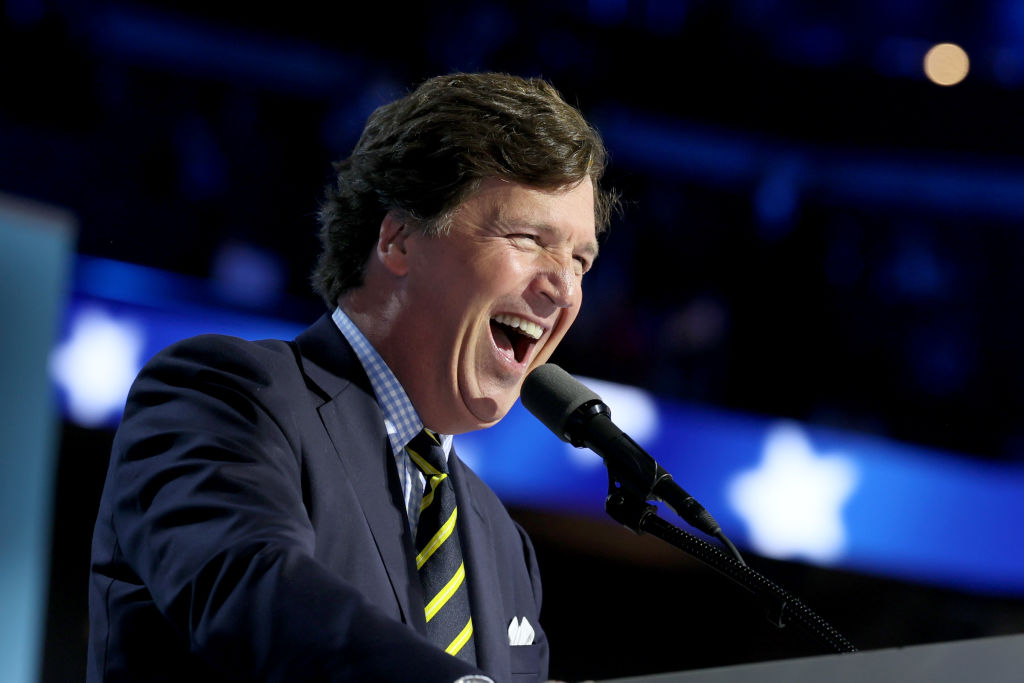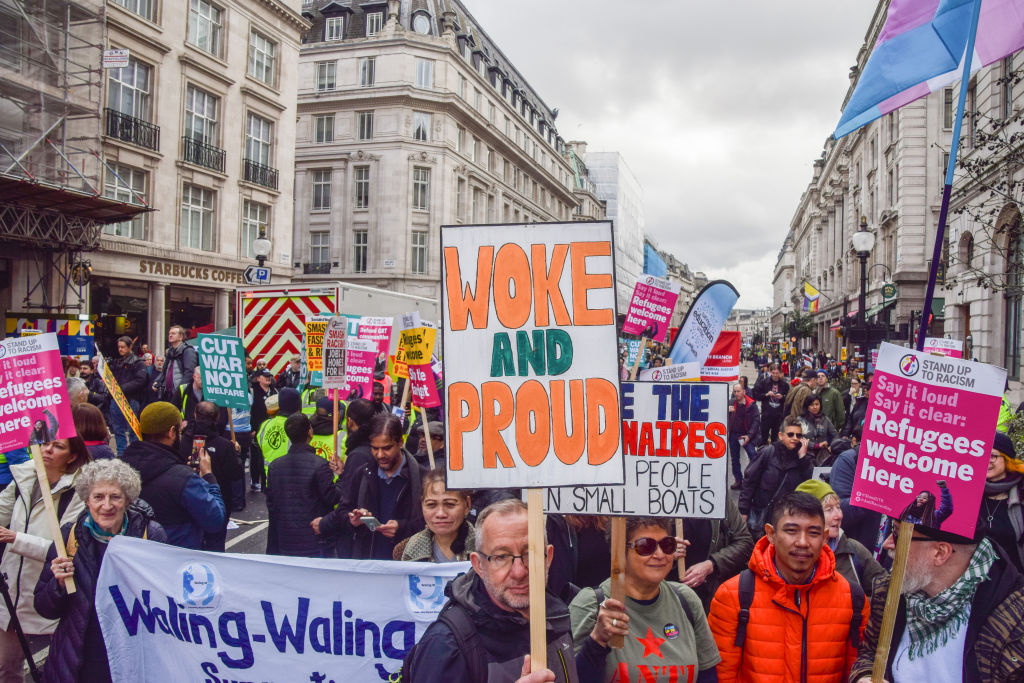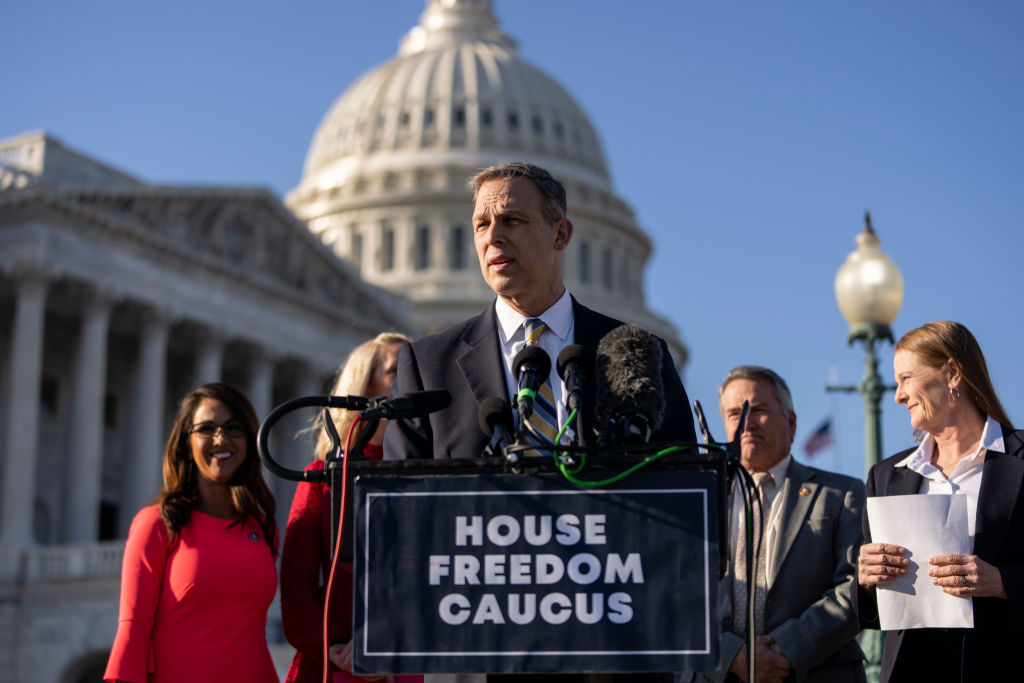This ideology is incompatible with the flourishing of the West.
The Specter of the “Woke Right”

Liberal critics of actual conservatism need to cool it.
A specter is haunting the contemporary Right.
This particular ghost goes by the name “woke Right”—a term pushed by admitted non-conservative James Lindsay, and subsequently adopted by others such as Konstantin Kisin.
Part of the term’s attractiveness is its amorphousness. It clearly can mean many things to many people, from targeting alleged racism or anti-Semitism on the Right to simply referring to a person on the Right whom “classical liberals” (hereafter “liberals”) dislike. To the extent that the term has any coherence, it is a critique of the right-wing’s so-called use of identity politics.
There is an aspect of the “woke Right” accusation that is inherently parasitic. With the Right having successfully stigmatized “wokeness”—most voters now realize it’s insane and dangerous—liberals are now attempting to apply that term to the Right, claiming that its critique of the Left has gone too far.
Politics, especially in a two-party, winner-take-all system, is about alliances. I don’t bear any personal ill will for Lindsay, Kisin, or the rest of the folks throwing around “woke Right” and related epithets. Despite my disagreement with both their tactics and ideology, I recognize that effective political alliances often involve groups that do not agree on fundamentals. They have been, at times, useful allies against the hard Left, and I expect they might be so again. But they are not driving the bus, and they are not conservatives (unlike the insufferable critics at outlets like The Bulwark and The Dispatch, most “woke Right” accusers when pressed don’t even claim to be conservative).
Ultimately, much of the “woke Right” critique is fundamentally grounded in liberal notions of the value of an “open society,” a concept first formulated by Karl Popper and further popularized by George Soros’s Open Society Foundations. Liberals like Lindsay implicitly embrace the words of Canadian Prime Minster Justin Trudeau, who recently said of immigrants who moved to Canada that “this is your country, more than it is for others, because we take it for granted.” To have any other definition would be essentially “woke.”
Lindsay and his allies are quick to point to a few extremists who actually embrace the “woke Right” label, but none of these are prominent mainstream leaders. Lindsay, who seems to be the progenitor of the “woke Right” label, defines an “enemy,” by way of the controversial German political philosopher Carl Schmitt, as “Someone who wants to end your way of life.” He claims this accurately represents the views of the “woke Right” with respect to America.
And what is this American way of life that Lindsay exalts?
“The American way of life…is one predicated on the freedom of the individual person to pursue his own happiness on terms set voluntarily by him with the communities he chooses for himself.”
Conservatives, of course, recognize this as part of an American vision, and certainly the part embraced by libertarians—but deny that this is the totality of the American vision.
Lindsay is angry that “The Woke Right wants to…override the concept of individual sovereignty in favor of group sovereignty, in the name of a greater good. You are to sacrifice some of who you are for who they say you have to be, ethically, morally, ethnically.”
Indeed the desirability of sacrificing some of who you are has always been what it means to live in community with others. This practice has a rich tradition in American life going back to the Pilgrims, who were anything but libertarians. When America has been at its greatest, citizens have always sacrificed some element of personal freedom for a communal and national identity. The alternative of a purely economic “community” of autonomous agents has been tried and found wanting as a platform for human flourishing. Finding the right balance between freedom and community, between individual self-expression and national and historic identity, made America great.
Lindsay claims the so-called “woke Right,” with its more communal aims, wants to take America “back to a romanticized past that never existed.” But most of the Right, including those of us old enough to remember what life was like in the 1980s, can confirm that while past eras were far from perfect, we shared a far better American culture. That was because we were unified around a culture, an ethnos, and an identity to a much greater degree than today.
The critiques of those such as Kisin don’t hit much nearer to the mark. As Jonathan Keeperman, the founder and editor of Passage Press who is known online as “Lomez,” points out, Kisin’s “first criteria” for being part of the “woke Right” is a belief that “the West is bad,” a position held by few, if any, of Kisin or Lindsay’s core targets.
“Woke Right” critics smear entirely mainstream writers and thinkers like The Blaze’s Auron MacIntyre. In response to “woke Right” accusations of his playing identity politics, MacIntyre summarizes what might be a typical conversation with a critic:
“I’m against identity politics”
“Okay great so we can repeal the Civil Rights Act?”
“WOKE RIGHT FASCIST!”
MacIntyre understands his critics far better than they do: “The ‘woke right’ slur was the last gasp of the containment right. The only question is how many frauds they take with them,” he observed on X.
MacIntyre’s critique is effective because it gets to the heart of the hypocrisy of “woke Right” critics. They are not actually interested in eliminating identity politics by removing, for example, all racial requirements, laws, and advantages from public life. They are simply opposed to conservatives—and in particular conservative white Americans—embracing their identities in response to the Left’s relentless use of identity politics over many decades.
This has been noted by a diverse collection of conservative critics. Charles Haywood of The Worthy House says the “woke Right” would be better called “the effective right,” while Will Chamberlain of the Article III Project correctly pegs “woke Right” accusers as “liberals trying to thought police.”
Connor Tomlinson writes in The Critic that what many “woke Right” theorists are really angry about is that white people would be able to organize on the basis of identity at all or notice that they are not being treated fairly by the current system, a point I made myself at book length in The Unprotected Class. “There is no problem with portraying oneself as disadvantaged if one has in fact been disadvantaged.” Tomlinson refers to the raft of liberal laws, many supported by critics of the “woke Right,” that empirically disadvantage many groups—in particular white conservative Christians.
“Woke Right” critics are even more appalled that the emerging Right is unapologetic about using state power to serve their interests, just as state power has been used to punish them for decades. The anonymous online commentator “Carlos Who Notices Things” equates this logic of “woke Right” critics to saying that “using the state to stop communism is communism.”
The older, wiser right-wing establishment understood this well. As Bill Buckley once said of critics who claimed that his advocacy of using the Army to stop communist revolutions was equivalent to using the Army to start them, “That is like saying that the man who pushes a little old lady into the path of a bus is morally equivalent to the man who pushes her out of its path, because they both push little old ladies around.” “Woke Right” critics are ultimately liberal proceduralists (with emphasis on both of those terms), but conservatives like Buckley understood that actual conservative substance matters.
Indeed, even though I believe we should avoid personal malice, we must say to the disaffected liberals who denigrate the “woke Right”—liberals who were mugged by reality, but evidently not brutally enough for them to become fully sensible—that they are not allowed to police us in either tone or substance.
Or as the late paleoconservative University of Michigan professor Stephen Tonsor once said of the neoconservatives, “It is splendid when the town whore gets religion and joins the church. Now and then she makes a good choir director, but when she begins to tell the minister what he ought to say in his Sunday sermons, matters have been carried too far.”
Personally, I am pleased that Kisin, Lindsay, and their ilk have “gotten religion”—or at least repudiated the worst elements of their old leftist one. But they are telling too many conservative ministers with many years in the movement what to say in their Sunday sermons.
They are welcome to join us as allies on the issues we agree on. But liberals do not get to define actual conservatism as the so-called “woke Right,” nor do they get to contain it to suit their own fundamentally liberal pieties.
The American Mind presents a range of perspectives. Views are writers’ own and do not necessarily represent those of The Claremont Institute.
The American Mind is a publication of the Claremont Institute, a non-profit 501(c)(3) organization, dedicated to restoring the principles of the American Founding to their rightful, preeminent authority in our national life. Interested in supporting our work? Gifts to the Claremont Institute are tax-deductible.
Celebrating the railsplitter’s 216th birthday.
The official Republican vision of political power is so constrained that you have to wonder why they want it.
Why right-wing parties there are still behind America.
Restoring pride in the military will require a massive effort.
A proposed executive order for deprogramming bureaucrats.






